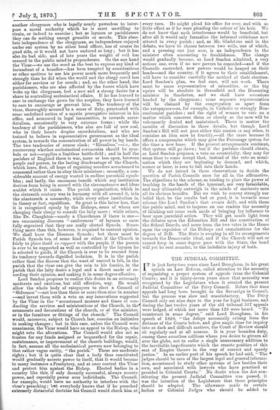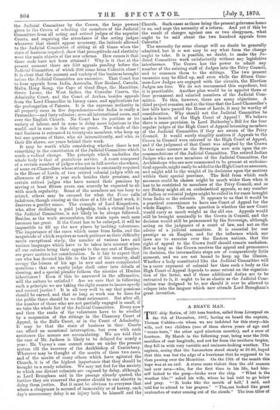THE JUDICIAL COMMITTEE.
IT is just forty-two years since Lord Brougham, in his great speech on Law Reform, called attention to the necessity of organizing a proper system of appeals from the Colonial Courts ; and it is thirty-seven years since that necessity was recognized by the Legislature when it created the present Judicial Committee of the Privy Council. Before that time appeals had long been brought to the Sovereign in Council, but the process was slow and unsatisfactory. The Privy Council only sat nine days in the year for legal business, and during the last twelve years of the old tribunal 517 appeals were lodged, of which not more than 129 were heard. "To counteract in some degree," said Lord Brougham, in his speech of 1828, "the delays necessarily arising from the distance of the Courts below, and give ample time for inquiry into so dark and difficult matters, the Court of Review should sit regularly and at all seasons. It is your bounden duty, among these countless millions whom you desire to govern all over the globe, not to suffer a single unnecessary addition to the inevitable impediments which the remote position of this seat of Empire throws in the way of correct and speedy justice." In an earlier part of his speech he had said, "The • judges should be men of the largest legal and general informa- tion, accustomed to study other systems of law besides their own, and associated with lawyers who have practised or presided in Colonial Courts." No doubt when the Act con- stituting the present Judicial Committee was passed, it was the intention of the Legislature that these principles should be adopted. The allowance made to certain Indian or Colonial Judges who should be added to
the Judicial Committee by the Crown, the large powers given to the Crown of selecting the members of the Judicial Committee from all acting and retired judges of the superior Courts, and requiring the attendance of the acting judges whenever that should appear necessary, the latitude allowed to the Judicial Committee of sitting at all times when the state of business required, show that promptitude and elasticity were the main objects of the new scheme. How comes it that these ends have not been attained ? Why is it that at the present moment there are 350 appeals pending before the Judicial Committee, of which 200 come from Calcutta alone ?
it is clear that the amount and variety of the business brought before the Judicial Committes are excessive. That Court has to hear appeals from India, Australia, New Zealand, Canada, Malta, Hong Kong, the Cape of Good Hope, the Mauritius, Sierra Leone, the West Indies, the Consular Courts, the Admiralty Court, and the Court of Arches, besides appeals from the Lord Chancellor in lunacy cases, and applications for the prolongation of Patents. It is the supreme authority in all property cases in five dependencies—for India is really a Pentarchy—and forty colonies ; over all international cases, and over the English Church. No Court has its position or its variety of labour, and in none is delay more injurious to the world, and in none is the delay so great. The whole of this vast business is entrusted to twenty-six members, who keep up but one quorum of three, who sit intermittently, and who, as their file shows, are years behind their work.
It may be worth while considering whether there is not something in the constitution of the Judicial Committee which needs a radical change. The principle which underlies the whole body is that of gratuitous service. A court composed of a certain number of judges who are in full service elsewhere, of some ex-Chancellors whose attendance is constantly required in the House of Lords, of two retired colonial judges with an allowance of £400 a year each besides their pensions, and certain retired judges who have earned their pensions by serving at least fifteen years, can scarcely be expected to sit with much regularity. Some of the members are too busy to attend, others may be excused for what the Times calls indolence, though coming at the close of a life of hard work, it deserves a gentler name. The example of Lord Kingsdown, who, after declining a paid judgeship, took a virtual lead in the Judicial Committee, is not likely to be always followed. Besides, as the work accumulates, the strain upon such men becomes too great. If the Court has to be enlarged, it will be impossible to fill up the new places by inviting volunteers. The importance of the cases which come from India, and the magnitude of which requires as much patience as their difficulty needs exceptional study, the number of various laws and various languages which have to be taken into account when all our colonies bring their appeals to the one seat of Empire, are grave matters for consideration. Is it fair to expect that one who has devoted his life to the law of his country, shall occupy the leisure of his age in new and more complicated questions ; that an equity judge shall enter into details of steering, and a special pleader fathom the niceties of Hindoo inheritance ? Even if this be answered in the affirmative, will the suitors be satisfied ? Are we sure that in following such a principle we are taking the right course to insure speedy and correct justice ? It is all very well to say that pensions should be earned, and that so long as work can be done for the public there should be no final retirement. But after all, the number of those who are not partially engaged is small, if we take the whole list of the Judicial Committee. Every now and then the ranks of the volunteers have to be swelled by a suspension of the sittings in the Chancery Court of Appeal, in the Rolls Court, or in the Court of Admiralty. It may be that the state of business in thosKi Courts can afford an occasional interruption, but even with such assistance the arrears are accumulating. We are told that the case of Mr. Jackson is likely to be delayed for nearly a year ; Mr. Voysey's case cannot come on under the present system till the recovery of the Archbishop of Canterbury. Whatever may be thought of the merits of these two cases, and of the merits of many others which have agitated the Church, it is of the highest importance that they should be brought to a ready solution. We may not feel for the anxiety to which our distant colonists are exposed by delay, although, as Lord Brougham said in the passage already quoted, the further they are removed the greater should be our alacrity in doing them justice. But it must be obvious to everyone that where a clergyman is accused of immorality or of heresy, each day's unnecessary delay is an injury both to himself and the
Church. Such oases as these bring the present grievance home to us, and urge the necessity of a reform. And yet if this be the result of charges against one or two clergymen, what ought to be said about the two hundred appeals from Calcutta ?
The necessity for some change will no doubt be generally admitted, but it is not easy to say what form the change ought to take. It is possible, no doubt, to make the Ju- dicial Committee work satisfactorily without any legislative interference. The Crown has the power to admit any number of the existing staff of Judges into the Privy Council, and to summon them to the sittings. The two present , vacancies may be filled up, and even while the fifteen Com- mon-Law Judges are engaged with the circuits, the Election Judges are free. We do not recommend this expedient, but it is practicable. Another plan would be to appoint three or four permanent and salaried members of the Judicial Com- mittee. To this, however, there are many objections. A third project remains, and at the time that the Lord Chancellor's law bills have passed the House of Lords, it may be worthy of consideration. Why should not the Judicial Committee be made a branch of the High Court of Appeal ? We believe there is some provision in Lord Hatherley's Bill for the four regular judges of the High Court of Appeal becoming members of the Judicial Committee, if they are sworn of the Privy Council. It would surely simplify matters if Appeals to the Crown in Council were referred to the High Court of Appeal, and if the judgment of that Court was adopted by the Crown in the same manner as the Sovereign now acts upon the re- commendations of the Judicial Committee. The retired Indian Judges who are now members of the Judicial Committee, the Archbishops who are now summoned to be present at ecclesias- tical appeals,might easily be added to the High Court as assessors, and might add to the weight of its decisions upon the matters within their special province. The field from which such assessors could be chosen might be much wider than when it has to be restricted to members of the Privy Council, and as any Bishop might sit on ecclesiastical appeals, so any number of Indian or colonial judges might be called in for cases brought from India or the colonies. It appears to us that it would be a practical convenience to have one Court of Appeal for the whole Empire. The main question is whether the new Court would carry as much weight as the old one. Appeals would still be brought nominally to the Crown in Council, and the decision would still be pronounced by the Sovereign, although acting on the judgment of a court of law, and not on the advice of a judicial committee. It is essential for our prestige as an Empire, and for the influence which our laws are to exercise over the Eastern nations, that the right of appeal to the Crown itself should remain unshaken. But so long as the Crown receives the appeal and pronounces its decision, the intermediate steps are of comparatively little moment, and we are not bound to keep up the illusion. Whether a body constituted like the Judicial Committee will be a surer exponent of colonial law than such a body as the High Court of Appeal depends to some extent on the organiza- tion of the latter, and if these additional duties are to be entrusted to it, it ought to be as elastic as the Judicial Com- mittee was designed to be, nor should it ever be allowed to relapse into the languor which now attends Lord Brougham's great invention.































 Previous page
Previous page